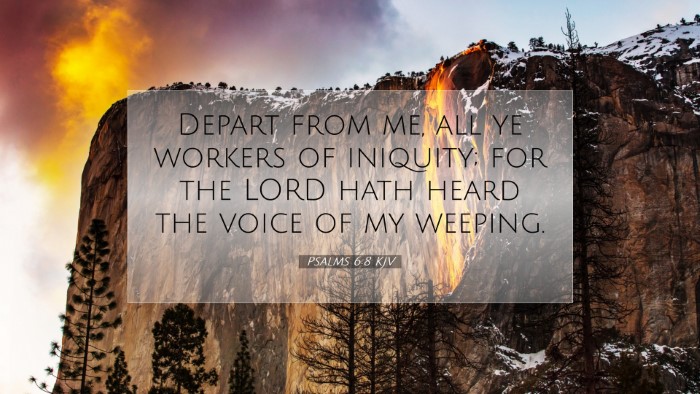Commentary on Psalms 6:8
Psalms 6:8 (KJV): "Depart from me, all ye workers of iniquity; for the Lord hath heard the voice of my weeping."
Introduction
This Psalm, attributed to David, emerges from a period of deep distress. In this verse, the psalmist commands the workers of iniquity to depart, suggesting a profound awareness of his own spiritual and moral stance contrasted against the fabric of sin surrounding him. This commentary will explore the theological and practical implications of this verse through insights from respected public domain commentators.
The Context of Suffering
Matthew Henry notes the significance of the psalmist's emotional state. David’s declaration reflects not only personal anguish but also the oppression felt by the faithful under the burden of sin. It serves as a reminder that the righteous may often find themselves isolated amidst a generation actively engaged in transgression.
Albert Barnes adds that this verse articulates a powerful call-to-action for those who tend to surround themselves with evil influences. David's weeping symbolizes a heart contrite and broken, beckoning all who dwell in iniquity to recognize their separation from the righteous.
The Call to Depart
In declaring, "Depart from me," the psalmist emphasizes the importance of spiritual purity. Adam Clarke elucidates this by stating that the call is not merely a plea but a command, indicative of the sanctity one must maintain in the face of pervasive sin. The invocation to depart suggests a profound understanding that one's environment and companionship can significantly affect one’s spiritual journey.
Matthew Henry further expounds that this statement is made with a sense of urgency; those engaged in sin must not remain in the presence of the righteous, especially in times of affliction. The implication here is twofold: it serves both as a warning to the sinners and an affirmation of the psalmist's commitment to holiness.
The Role of Divine Hearing
David proclaims that "the Lord hath heard the voice of my weeping." This assertion carries immense weight in the context of suffering. Albert Barnes interprets this as the pivotal shift in David's plight, where his sorrowful cries have resonated with God. This acknowledgment of God's attentive ear imbues the psalm with hope, underscoring an assurance that God is ever-present even in one's darkest moments.
Adam Clarke emphasizes that this phrase reveals a deep relational aspect of the believer's cry to God. It serves as a reminder that our experiences of pain and supplication are never in vain. The God who hears is also the God who acts, and such realization is instrumental for the believer’s perseverance.
Theological Implications
This verse encapsulates several key theological themes: the concept of sin, the nature of God as attentive to suffering, and the call for righteous living. Matthew Henry notes the juxtaposition of iniquity and the hearer of prayers — an illustration of God's justice against the backdrop of human frailty.
Albert Barnes argues that the verse reflects the believer’s dilemma in a sinful world, yet it showcases God's faithfulness amidst chaos and tumult. The conviction that God hears one's weeping can catalyze a transformative journey, providing the strength to demand separation from iniquity.
Pastoral Application
For pastors and church leaders, this verse serves as a poignant reminder of the necessity for discernment within congregations. Adam Clarke suggests that believers should cultivate a sensitive heart to negative influences and proactively advocate for a holy separation from sin, both personally and corporately.
Matthew Henry urges church leaders to remind their communities of the importance of integrity and the necessity of weeping over sin as a pathway to restoration. In moments of grief, it is essential to communicate to the congregation the assurance that God hears and cares for their struggles.
Conclusion
Psalms 6:8 stands as a powerful declaration layered with emotional weight, spiritual urgency, and rich theological insight. As we reflect on David's words, we are prompted to consider our own walks amidst a world rife with iniquity. May we, like David, understand the significance of crying out to God, while simultaneously asserting our commitment to a holy life, sensitive to the distractions of sin. In our sufferings, let us remember: God hears our weeping!


